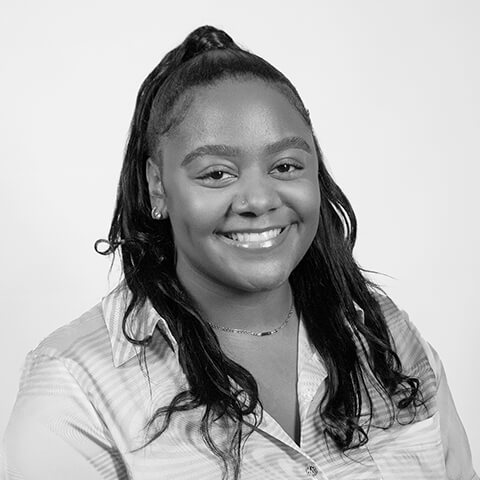Searching for Signs
Let’s rewind back to September 2020: COVID-19 cases were on the rise again and I was 8 months away from graduating in the middle of a pandemic—talk about anxiety! I spent a lot of my time at North Carolina A&T State University looking for career signs. When we were younger, my brother tore his ACL and his physical therapist incorporated me into his rehabilitation journey. I saw this as a sign that I should study kinesiology and become a physical therapist myself. Then the pandemic hit.
As COVID-19 began to disproportionately affect communities of color, I found myself increasingly interested in addressing health disparities. The media often highlighted that Black and Latinx people were more susceptible to COVID-19 and were more likely to suffer from fatal cases than white patients. But it had nothing to do with genetics—minority communities had disproportionately higher exposure to COVID-19 due to social and environmental factors. In December 2020, I conducted research assessing the effectiveness of North Carolina’s communications about COVID-19 to minority communities. The research involved lots of roundtable discussion with Black and brown residents from different parts of the state and getting their perspectives on the state’s COVID-19 response and the health information communicated to them. The research was the most fulfilling work I have ever done, and I started to wonder if this was another career sign. Graduation was around the corner, but I knew I wanted to pivot my career path and pursue something related to research and advocacy. The Sign That Spoke
The Sign That Spoke
I changed my career path just months before turning the tassel knowing only a few things: I wanted to work in healthcare, get experience that provided a lot of exposure, and work in an environment that allowed me to grow intellectually and creatively. I started my LinkedIn search and quickly stumbled upon M Booth Health and its blog called “Healthy Debate.” I read one post with the intriguing and relatable title, “No Trust Without Truth,” which discussed what needed to be done to build confidence in COVID-19 vaccines within communities like mine. It was a conversation I was already having with classmates and peers, and I was thrilled to see a company talking about it too. Before I knew it, I was deep in the rabbit hole reading various M Booth Health blog posts, and I knew I wanted to be a part of the conversations they were catalyzing. I had only just decided to pursue a new career path—how fortuitous that I so quickly stumbled on what looked like the ideal place to start it.
Catalyzing Conversations as a Summer Intern
I joined M Booth Health this summer as its Public Affairs summer intern, supporting multiple teams in communications, research, and media/trends monitoring. I’m now wrapping up my internship, and the experience has been better than I could have imagined. I’ve had a hand in catalyzing conversations about health issues I’ve always been passionate about while learning about new ones.
When the pandemic hit, a lot of our clients (rightfully) shifted their focus. As a result, other health issues have received less attention, especially from the media. It’s important that we resurface conversations about health issues that have been overshadowed by COVID-19, especially those that disproportionately affect communities of color, and make sure they are not neglected. One way I’ve contributed to igniting these conversations is through research and media scans, which provide insight on what current health conversations look like and how we can call attention to important but ignored health issues in a competitive, COVID-19-focused news environment.
Recently, a client wanted to understand the key policy positions and needs of national HIV advocacy groups, as part of its efforts to end the HIV epidemic. One of the biggest priorities across the board, including the client’s, was to address HIV-related inequities facing minority populations. It was refreshing to know that a company like M Booth Health prioritizes working with clients that value health equity. It’s the kind of work that does not feel like work; it feels like changing the world.
When Conversation Is the Culture
Sometimes my generation can get a lot of criticism for being picky about where we decide to work. However, I see this “pickiness” as a valuable skill, because it’s important to be in a workplace that is healthy, positive, and enjoyable. M Booth Health is all that and then some. The work doesn’t feel like work when you’re collaborating with people who inspire you, who want to see you do well, and who allow you to be your most creative self.
The M Booth Health mantra is “Catalyzing the conversations and connections that lead to better health for people everywhere,” and it is a reflection of the work culture. I’ve seen first-hand M Booth Health’s mantra in action, whether it’s participating in brainstorms generating genius ideas, or during day-to-day team calls. Everything that happens here is always intentionally centered around better health for all people. M Booth Health allows for and is equipped to have any conversation, even the tough ones.
In my college chemistry class I learned that a catalyst is a substance that increases the rate of a chemical reaction. Sometimes this results in a tough reaction; one that might spill everywhere, create an explosion, or get really hot. But just like when we participate in tough or difficult conversations, we have an opportunity to learn from, build trust, and respect such a reaction. I’m grateful for my time at M Booth Health, which has encouraged me to be a catalyst for change and hold on to my values for a healthier, more equitable world.
I am pleased to report, M Booth Health just offered me a full-time job. And I accepted!


